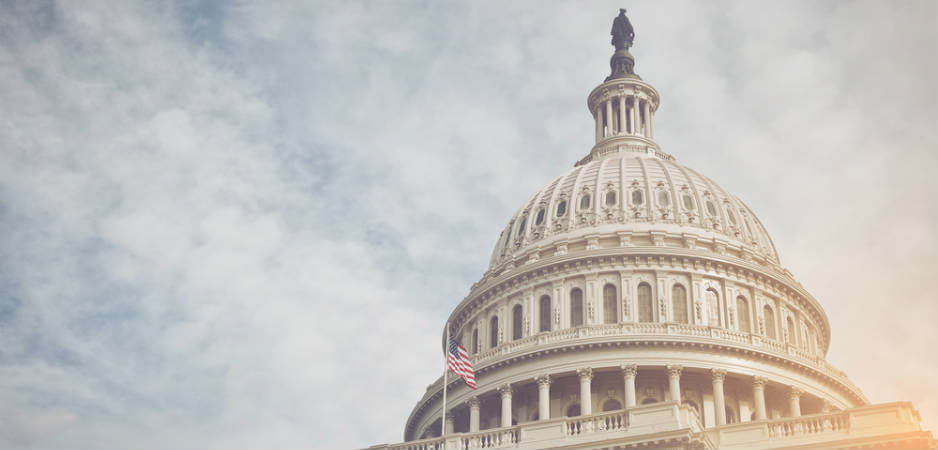It’s happened again: For lack of a budget, the US government has been forced to shut down.
Government shutdowns have become an unfortunate by-product of American democracy. This one, which began at midnight, January 20 — ironically the one year anniversary of President Trump’s inauguration — is the fifth such shutdown dating back to 1990. Previous closures typically lasted a day or perhaps a weekend, when the impact on the public is less. But closures between December 1995 and January 1996, and again in October 2013, lasted 21 and 15 days, respectively.
Closures occur when the US Congress, which controls the budget process, is unable to agree on funding priorities, typically because of specific issues that may often have nothing to do with spending. In this latest case, as in almost all prior ones, partisanship on certain issues led to the suspension. Republicans want to see spending toward President Donald Trump’s promised border wall with Mexico, despite his campaign insistence that “Mexico would pay for it.” Democrats and, in fact, most border security experts, agree that an actual wall would prove too expensive and ineffective in stopping illegal immigration.
Democrats, on the other hand, insist that any spending bill address some 800,000 undocumented people, known as “dreamers,” who were brought to the US as minors by their parents or guardians who entered illegally, mostly from Mexico and Central America. Being underaged and having had no say in the decision, they should be granted some sort of waiver for permanent legal status, Democrats argue. A significant majority of Americans agrees. President Obama signed an executive order known as Deferred Action for Childhood Arrivals, or DACA, in June 2012, to allow these dreamers to remain in the country with some legal status after Congress failed to take action. President Trump rescinded the order in September of last year.
A Broken Process
Government closures are the most visible signs of the broken nature of the budget process in the United States. The world’s oldest democracy cannot achieve something that nearly every other nation in the world manages every year — pass a budget on time. In fact, in the four decades since the current system for budgeting and spending tax dollars has been in effect, Congress has managed to pass all its required appropriations measures on time only four times. Most of the time, it has resorted to something called a continuing resolution to keep the government open without a full budget, essentially a stopgap measure that allows basic functions like payroll, retirement, welfare payments and other essential functions to continue, but no new projects or spending to be undertaken. US government employees are well familiar with “the CR” and have come to loathe it.
Importantly, under closures and continuing resolutions, all of America’s national security operations, e.g., its armed forces, security and safety functions from the FBI and Federal Aviation Administration to the Transportation Security Administration inspectors at airports and other vital tasks continue. Employees may not be paid, however, until the budget, or at least a CR, is agreed.
The fact is that both issues, border security and immigration, deserve a full and comprehensive debate among America’s citizens and in the media, but especially within the Congress. Following such debates and discussions, Congress should then take up both issues, whether separately or jointly, but not linked to the debate over funding the entirety of the US government. That much is evident to almost all Americans, but apparently not to their representatives in Congress.
Partisanship Leads to Brinkmanship
Partisanship in the country has produced a hyper-partisanship within the government, effectively paralyzing the functions of normal governance. It may almost be defined as a tribalism that causes such extreme separation between opposing points of view that any compromise, or even the willingness to listen to the other side, is foreclosed.
Americans are practically as divided on these issues and others as their representatives. With the proliferation of unchecked social media, diminishment of respectable and responsible coverage and heavily partisan public discourse, such as that at Fox News and MSNBC, citizens need only tune into points of view with which they already agree and which predictably demean, distort and misinform about the other.
That may be the core of America’s problem. If Americans are so steeped in their newfound political tribalism that they are unwilling to listen to the other side and work to seek compromise, then it shouldn’t be difficult to understand this Congress: Their elected representatives are a reflection of themselves.
In Congress, where the nation’s business is done and differences resolved, when the two sides cannot even agree to take up issues in free and open debate in committees and on the floor of the Congress, the system is broken. Brinkmanship, as in holding up the government budget, has become the standard go-to means of addressing problems. This is no solution at all. As of this writing, that appears to be the direction the Congress is headed even as a short-term fix of the current impasse appears to have been agreed upon.
It may be time for Americans to look at themselves in the mirror and then at their fellow citizens. They may want to start by asking themselves what makes it so hard to listen and then asking “the other” to explain his or her beliefs, and do so without looking for a counterargument. Just listen. It might also help if all Americans sought more information about points of view at odds with their own. Perhaps reflecting on how the country did, or didn’t, cope with political estrangement in its past — on issues such as slavery, secession, taxation, social security, war and civil rights — might also serve as a guide to today’s problem-solving.
It is too easy to blame today’s partisanship on Donald Trump. But he didn’t start it, although he’s apparently quite adept at exploiting it for his own partisan purposes. President Trump isn’t the cause but rather a manifestation of the nation’s growing intolerance of complexity, diversity and pluralism. Its marvelous system of democracy allows for dealing with such matters. Americans will have to want it, and want to give it a chance.
The views expressed in this article are the author’s own and do not necessarily reflect Fair Observer’s editorial policy.
Photo Credit: Brandon Bourdages / Shutterstock.com
Support Fair Observer
We rely on your support for our independence, diversity and quality.
For more than 10 years, Fair Observer has been free, fair and independent. No billionaire owns us, no advertisers control us. We are a reader-supported nonprofit. Unlike many other publications, we keep our content free for readers regardless of where they live or whether they can afford to pay. We have no paywalls and no ads.
In the post-truth era of fake news, echo chambers and filter bubbles, we publish a plurality of perspectives from around the world. Anyone can publish with us, but everyone goes through a rigorous editorial process. So, you get fact-checked, well-reasoned content instead of noise.
We publish 2,500+ voices from 90+ countries. We also conduct education and training programs
on subjects ranging from digital media and journalism to writing and critical thinking. This
doesn’t come cheap. Servers, editors, trainers and web developers cost
money.
Please consider supporting us on a regular basis as a recurring donor or a
sustaining member.
Will you support FO’s journalism?
We rely on your support for our independence, diversity and quality.







